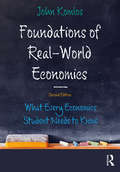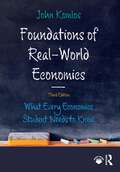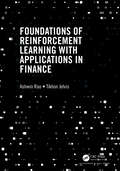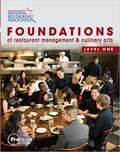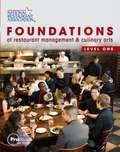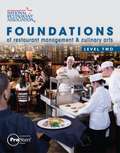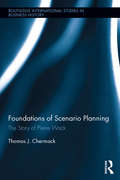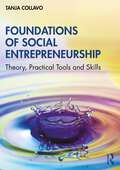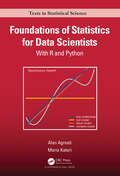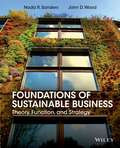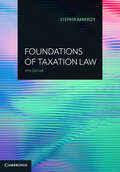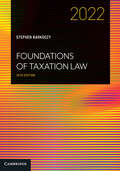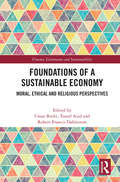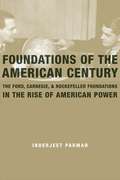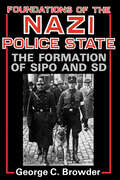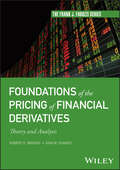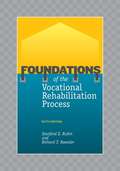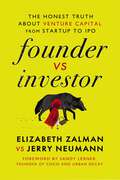- Table View
- List View
Foundations of Real World Economics: What Every Economics Student Needs to Know
by John KomlosThe 2008 financial crisis, the rise of Trumpism and the other populist movements which have followed in their wake have grown out of the frustrations of those hurt by the economic policies advocated by conventional economists for generations. Despite this, textbooks continue to praise conventional policies such as deregulation and hyperglobalization. This textbook demonstrates how misleading it can be to apply oversimplified models of perfect competition to the real-world. The math works well on college blackboards but not so well on the Main Streets of America. This volume explores the realities of oligopolies, the real impact of the minimum wage, the double-edged sword of free trade, and other ways in which powerful institutions cause distortions in the mainstream models. Bringing together the work of key scholars, such as Kahneman, Minsky, and Schumpeter, this book demonstrates how we should take into account the inefficiencies that arise due to asymmetric information, mental biases, unequal distribution of wealth and power, and the manipulation of demand. This textbook offers students a valuable introductory text with insights into the workings of real markets not just imaginary ones formulated by blackboard economists. A must-have for students studying the principles of economics as well as micro- and macroeconomics, this textbook redresses the existing imbalance in economic teaching. Instead of clinging to an ideology that only enriched the 1%, Komlos sketches the outline of a Capitalism with a human face, an economy in which people live contented lives with dignity instead of focusing on GNP.
Foundations of Real-World Economics: What Every Economics Student Needs to Know
by John KomlosThe 2008 financial crisis, the rise of Trumpism, and the other populist movements which have followed in their wake have grown out of the frustrations of those hurt by the economic policies advocated by conventional economists for generations. Despite this, textbooks remain frozen in time, continuing to uphold traditional policies as though nothing has happened. Foundations of Real-World Economics demonstrates how misleading it can be to apply oversimplified models of perfect competition to the real world. The math works well on college blackboards but not so well on the Main Streets of America. This volume explores the realities of oligopolies, the real impact of the minimum wage, the double-edged sword of free trade, and other ways in which powerful institutions cause distortions in mainstream models. Bringing together the work of key scholars like Kahneman, Minsky, and Schumpeter, this textbook takes into consideration the inefficiencies that arise when the perfectly competitive model is applied to the real world dominated by multinational oligopolies. The third edition has been updated throughout, bringing in new material on the financial crises, the rise of populism, racism, inequality, climate change, and the Covid-19 pandemic. A must-have for students studying the principles of economics as well as micro- and macroeconomics, this textbook redresses the existing imbalance in economic teaching as John Komlos focuses on the paradigm of humanistic economics.
Foundations of Reinforcement Learning with Applications in Finance
by Ashwin Rao Tikhon JelvisFoundations of Reinforcement Learning with Applications in Finance aims to demystify Reinforcement Learning, and to make it a practically useful tool for those studying and working in applied areas — especially finance. Reinforcement Learning is emerging as a powerful technique for solving a variety of complex problems across industries that involve Sequential Optimal Decisioning under Uncertainty. Its penetration in high-profile problems like self-driving cars, robotics, and strategy games points to a future where Reinforcement Learning algorithms will have decisioning abilities far superior to humans. But when it comes getting educated in this area, there seems to be a reluctance to jump right in, because Reinforcement Learning appears to have acquired a reputation for being mysterious and technically challenging. This book strives to impart a lucid and insightful understanding of the topic by emphasizing the foundational mathematics and implementing models and algorithms in well-designed Python code, along with robust coverage of several financial trading problems that can be solved with Reinforcement Learning. This book has been created after years of iterative experimentation on the pedagogy of these topics while being taught to university students as well as industry practitioners. Features Focus on the foundational theory underpinning Reinforcement Learning and software design of the corresponding models and algorithms Suitable as a primary text for courses in Reinforcement Learning, but also as supplementary reading for applied/financial mathematics, programming, and other related courses Suitable for a professional audience of quantitative analysts or data scientists Blends theory/mathematics, programming/algorithms and real-world financial nuances while always striving to maintain simplicity and to build intuitive understanding.
Foundations of Restaurant Management & Culinary Arts, Level 1
by National Restaurant AssociationNIMAC-sourced textbook
Foundations of Restaurant Management and Culinary Arts: Level 1 (2nd Edition)
by National Restaurant AssociationIndustry-driven curriculum that launches students into their restaurant and food service career! Curriculum of the ProStart program offered by the National Restaurant Association. The National Restaurant Association and Pearson have partnered to bring educators the most comprehensive curriculum developed by industry and academic experts.
Foundations of Restaurant Management and Culinary Arts: Level One
by Prentice HallIndustry-driven curriculum that launches students into their restaurant and foodservice career! Curriculum of the ProStart® program offered by the National Restaurant Association. The National Restaurant Association and Pearson have partnered to bring educators the most comprehensive curriculum developed by industry and academic experts.
Foundations of Restaurant Management and Culinary Arts: Level Two
by Prentice HallIndustry-driven curriculum that launches students into their restaurant and foodservice career! Curriculum of the ProStart® program offered by the National Restaurant Association. The National Restaurant Association and Pearson have partnered to bring educators the most comprehensive curriculum developed by industry and academic experts.
Foundations of Scenario Planning: The Story of Pierre Wack (Routledge International Studies in Business History)
by Thomas J ChermackPierre Wack was head of scenario planning at Royal Dutch / Shell Oil in London for just over ten years. He died in 1997. He was a pioneer of what we know today as scenario planning – an alternative and complement to strategic planning. Scenarios explore a variety of possible futures for examining decisions in organizational planning. Pierre was a unique man with interests in Indian and Japanese cultures and traditions. He travelled extensively and led a unique life that involved long periods of visiting gurus in India and extended sabbaticals in Japan. His experiences with Eastern thought no doubt shaped his ability to evolve the scenario method at Shell, and as a result he was able to lead a team that foresaw the oil crises of the 1970’s and 80’s. This new volume will cover the basic context of his life timeline and attach it to the development of his thinking about scenario planning over the course of his career. After his death, Wack’s materials, papers and documents were collected by Napier Collyns and have recently been made available at the University of Oxford where the Pierre Wack Memorial Library has been established. These documents contain a variety of clues and stories that reveal more about who Pierre Wack was, how he thought and will provide details about scenario planning that have never been seen or published. They also reveal a curious man and include a timeline written by his wife, Eve, which details their relationship over the course of 40 years. Written for management and business historians and researchers, this book will uncover unseen contributions by a scenario planning pioneer shaped by significant events in his personal life that helped him to see the world differently.
Foundations of Shari'ah Governance of Islamic Banks
by Azhar Hamid Karim GinenaA practical guide for robust sharī'ah governance of the Islamic banking industry Debate in the market on the extent of sharī'ah compliance of Islamic banks, their products, and activities has piqued stakeholders' interest. In Foundations of Sharī'ah Governance of Islamic Banks, Karim Ginena and Azhar Hamid explore the depths of sharī'ah governance to unravel its mysterious dimensions, and equip academics and practitioners with a solid understanding of the subject, which has become a serious challenge and thus deserves dedicated attention. The authors make a strong case for the need to contain the sharī'ah risk that Islamic banks experience, and present a compelling argument for how this should be done. Ginena and Hamid propose a robust sharī'ah governance model that comprehensively tackles thisrisk, and helps improve the extent of sharī'ah compliance of market players. The authors detail the internal, external, and institutional arrangements needed to promote responsible sharī'ah governance, and critically analyze current laws, regulations, and industry practices on the topic. The chapters of the book do the following: Examine the roots, characteristics and objectives of sharī'ah and its relation to financial dealings; Probe the role of regulators in sharī'ah governance, explore the different approaches adopted by banking supervisors, and provide examples of relevant legal and regulatory measures; Explain to bank directors and management the fiduciary duty they assume with respect to sharī'ah compliance, and detail how they could discharge this responsibility in line with best practices; Elaborate on the purpose of the Sharī'ah Supervisory Board (SSB), its responsibilities, competence criteria, internal regulations, and key governance guidelines; additionally, they explore different SSB models; Describe the internal sharī'ah control system including its six components, and examine the internal sharī'ah audit function as well as different stages of conducting a sharī'ah audit; Clarify the role of a sharī'ah auditor, with guidance on reporting lines, scope of duties, authority, and practical ways on fulfilling tasks, such as a sample sharī'ah risk assessment grid and audit checklists; Discuss the newly emerging external sharī'ah advisory firms that are expected to play a key role in the coming years and the services they provide. Through an effective treatment of each of these elements, and the way that they interact with one another, the book offers a fresh take on how robust sharī'ah governance of Islamic banks can be successfully accomplished. It is a comprehensive resource for academics, regulators, directors, lawyers, auditors, consultants, employees, and customers of Islamic banks interested in learning more about these challenges. This essential reading persuasively extends the discourse on the subject and addresses critical sharī'ah issues that have policy implications for decision makers in jurisdictions aiming to attract the fast-growing Islamic finance industry or increase their market share.
Foundations of Social Entrepreneurship: Theory, Practical Tools and Skills
by Tanja CollavoFoundations of Social Entrepreneurship presents definitions of social entrepreneurship, explains its benefits and challenges, describes the components of an ecosystem of support, and presents practical tools to approach social entrepreneurial projects. It is designed to be easily approachable by anyone without prior in-depth knowledge of the subject. The book is divided into two parts; the first provides readers with theoretical foundations to understand the phenomenon of social entrepreneurship, its different interpretations, the context in which it developed, and its socio-economic function. The second part of the book covers what it takes to create and manage a social entrepreneurial initiative. Pedagogical features are incorporated throughout to aid learning. They include summary tables, international case studies of social entrepreneurs from both developed and emerging economies, as well as suggested exercises and examples of how the tools presented are used in practice. Truly global in its scope, with a strong emphasis on combining theory with practice, this text should be core reading for advanced undergraduate and postgraduate students studying Social Entrepreneurship, Enterprise, and Responsible Business. Online resources include links to resources, chapter-by-chapter PowerPoint slides and instructor's manual.
Foundations of Sport Development
by Chris MackintoshOffering a complete introduction to sport development policy and practice, this book covers key theory, themes, issues, and debates in sport development, without assuming any prior knowledge on the part of the reader. It outlines the organisational landscape of sport in the UK and explains important differences across England, Scotland, Wales, and Northern Ireland, as well as the global context. Examining both community and elite sport, it covers public, private, and third sectors, including national and local government and national governing bodies, and considers change – cultural, managerial, social, and political – as an element of sport development policy, strategy, and operations. Every chapter includes an in-depth case study around which a seminar or tutorial can be based, as well as definitions of key concepts and terminology that students and practitioners are likely to encounter during their studies or professional practice. Questions at the end of each chapter encourage the reader to reflect on their own work, and useful guides to further reading make the book an ideal jumping off point for further study. This is the perfect foundation textbook for any sport development course taken as part of a degree program in sport development, sport management, or sport coaching.
Foundations of Statistics for Data Scientists: With R and Python (Chapman & Hall/CRC Texts in Statistical Science)
by Alan Agresti Maria KateriFoundations of Statistics for Data Scientists: With R and Python is designed as a textbook for a one- or two-term introduction to mathematical statistics for students training to become data scientists. It is an in-depth presentation of the topics in statistical science with which any data scientist should be familiar, including probability distributions, descriptive and inferential statistical methods, and linear modeling. The book assumes knowledge of basic calculus, so the presentation can focus on "why it works" as well as "how to do it." Compared to traditional "mathematical statistics" textbooks, however, the book has less emphasis on probability theory and more emphasis on using software to implement statistical methods and to conduct simulations to illustrate key concepts. All statistical analyses in the book use R software, with an appendix showing the same analyses with Python. The book also introduces modern topics that do not normally appear in mathematical statistics texts but are highly relevant for data scientists, such as Bayesian inference, generalized linear models for non-normal responses (e.g., logistic regression and Poisson loglinear models), and regularized model fitting. The nearly 500 exercises are grouped into "Data Analysis and Applications" and "Methods and Concepts." Appendices introduce R and Python and contain solutions for odd-numbered exercises. The book's website has expanded R, Python, and Matlab appendices and all data sets from the examples and exercises.
Foundations of Sustainable Business: Theory, Function, and Strategy
by Nada R. Sanders; John D. WoodSustainability as a strategic priority for all aspects of business, the text clearly defines all key concepts and shows how social, economic, and environmental trends are interconnected and relevant to corporate strategy. While the text provides an honest look at climate change, human trafficking, and environmental issues such as water shortage and ecosystem health,all normative guidance is based on traditional business value propositions, taking into account cost, risk, strategy, marketing potential, and operational feasibility.
Foundations of Taxation Law
by Stephen BarkoczyFoundations of Taxation Law provides a clear and comprehensive introduction to the policy, principles and practice that underpin the Australian taxation system. Designed as a guide for law and business students as well as tax practitioners, the text blends policy issues, taxation theory, black letter law and commercial practice into a succinct general principles text. Topics are presented in a logical and structured order and are cross-referenced to specific provisions in the legislation and relevant cases so that readers are able to easily find the source of the law. The text includes approximately 400 examples and dozens of diagrams and tables that condense the law and help clarify difficult concepts. This edition contains expanded technical and policy discussion of several areas of law. It has been substantially revised and restructured to take account of the many important legislative reforms, case law developments and announcements that have occurred over the last 24 months.
Foundations of Taxation Law 2022
by Stephen BarkoczyFoundations of Taxation Law provides a clear and comprehensive introduction to the policy, principles and practice underpinning the Australian taxation system. Designed as an introductory guide for law and business students as well as tax practitioners, the text focuses on general principles, blending policy issues, taxation theory, technical 'black letter law' and commercial practice into a succinct, principled text. Topics have been developed in a logical, structured order and are cross-referenced to specific provisions in the legislation and relevant cases so that readers can easily find the source of the law. The text includes approximately 400 examples and dozens of diagrams and tables that condense the law and clarify difficult concepts. This fourteenth edition has been substantially revised and restructured to take account of many important legislative reforms, case law developments, administrative changes and policy announcements. It is designed to be used in conjunction with the Core Tax Legislation and Study Guide 2022.
Foundations of a Sustainable Economy: Moral, Ethical and Religious Perspectives (Finance, Governance and Sustainability)
by Umar BurkiThis book addresses current practices related to sustainable development, its challenges and the future. People belonging to different genders regardless of their age, social class and education should be equal as citizens and individuals, and identical in their rights and responsibilities. The business sector, authorities, societies and religious circles have the potential to play a fundamental role in curbing social ills and the degradation of the environment in this modern world. The authors of this book argue that without good governance, the status of a human being is unlikely to improve. They make the case that to achieve sustainability, government, society and the economy must ensure a platform for people to participate in decision-making and benefit from the rights they are accorded. By covering a range of perspectives across economic, social and moral life, the book will shed light on the problems and possible solutions to sustainable development and the triple bottom line, of people, planet and profit, under the umbrella of morals and divine law. This will be a useful guide for undergraduate and postgraduate students across multiple disciplines, such as economics, religious studies, business studies, political science, anthropology and sociology.
Foundations of a Sustainable Market Economy: Guiding Principles for Change
by Gjalt de Jong Margreet Boersma-de JongThe free market underpins our economy and our way of thinking around enterprise and value, but it is also a major factor in the sustainability problems that we now live with. Climate change, child labour and oil spills are just a few of the many problems associated with our economic activity and, although many companies have made an effort to produce more sustainably, the pace of change is much too slow. This engaging and accessible textbook teaches students the relationship between the economy and sustainability, assessing the hand of the free market on company behaviour and, ultimately, providing a framework for transition to a sustainable economy.Using case studies and optional assessment questions, this textbook explains to students what a market is at the macro level and then translates the effects of the market to industries and subsequently to the strategic choices of companies at the micro level. It adopts a model of 8 guiding principles that underpin the current free market economy and 8 guiding principles for the sustainable market economy. Switching these deeply held principles will be essential to any serious transition to a sustainable economy.
Foundations of the American Century
by Inderjeet ParmarInderjeet Parmar reveals the complex interrelations, shared mindsets, and collaborative efforts of influential public and private organizations in the building of American hegemony. Focusing on the involvement of the Ford, Rockefeller, and Carnegie foundations in U.S. foreign affairs, Parmar traces the transformation of America from an "isolationist" nation into the world's only superpower, all in the name of benevolent stewardship.Parmar begins in the 1920s with the establishment of these foundations and their system of top-down, elitist, scientific giving, which focused more on managing social, political, and economic change than on solving modern society's structural problems. Consulting rare documents and other archival materials, he recounts how the American intellectuals, academics, and policy makers affiliated with these organizations institutionalized such elitism, which then bled into the machinery of U.S. foreign policy and became regarded as the essence of modernity.America hoped to replace Britain in the role of global hegemon and created the necessary political, ideological, military, and institutional capacity to do so, yet far from being objective, the Ford, Rockefeller, and Carnegie foundations often advanced U.S. interests at the expense of other nations. Incorporating case studies of American philanthropy in Nigeria, Chile, and Indonesia, Parmar boldly exposes the knowledge networks underwriting American dominance in the twentieth century.
Foundations of the American Century: The Ford, Carnegie, and Rockefeller Foundations in the Rise of American Power
by Inderjeet ParmarInderjeet Parmar reveals the complex interrelations, shared mindsets, and collaborative efforts of influential public and private organizations in the building of American hegemony. Focusing on the involvement of the Ford, Rockefeller, and Carnegie foundations in U.S. foreign affairs, Parmar traces the transformation of America from an "isolationist" nation into the world's only superpower, all in the name of benevolent stewardship.Parmar begins in the 1920s with the establishment of these foundations and their system of top-down, elitist, scientific giving, which focused more on managing social, political, and economic change than on solving modern society's structural problems. Consulting rare documents and other archival materials, he recounts how the American intellectuals, academics, and policy makers affiliated with these organizations institutionalized such elitism, which then bled into the machinery of U.S. foreign policy and became regarded as the essence of modernity. America hoped to replace Britain in the role of global hegemon and created the necessary political, ideological, military, and institutional capacity to do so, yet far from being objective, the Ford, Rockefeller, and Carnegie foundations often advanced U.S. interests at the expense of other nations. Incorporating case studies of American philanthropy in Nigeria, Chile, and Indonesia, Parmar boldly exposes the knowledge networks underwriting American dominance in the twentieth century.
Foundations of the Nazi Police State: The Formation of Sipo and SD
by George C. BrowderA comprehensive study of the lesser-known organizations that formed the heart of the Nazi police state in World War II Germany.The abbreviation “Nazi,” the acronym “Gestapo,” and the initials “SS” have become resonant elements of our vocabulary. Less known is “SD,” and hardly anyone recognizes the combination “Sipo and SD.” Although Sipo and SD formed the heart of the National Socialist police state, the phrase carries none of the ominous impact that it should.Although no single organization carries full responsibility for the evils of the Third Reich, the SS-police system was the executor of terrorism and “population policy” in the same way the military carried out the Reich’s imperialistic aggression. Within the police state, even the concentration camps could not rival the impact of Sipo and SD. It was the source not only of the “desk murderers” who administered terror and genocide by assigning victims to the camps, but also of the police executives for identification and arrest, and of the command and staff for a major instrument of execution, the Einsatzgruppen.Foundations of the Nazi Police State offers the narrative and analysis of the external struggle that created Sipo and SD. This book is the author’s preface to his discussion of the internal evolution of these organizations in Hitler’s Enforcers: The Gestapo and the SS Security Service in the Nazi Revolution.“A welcome addition to the literature on National Socialist Germany.” —American Historical Review“Sheds new light on Himmler’s role in the complex web of the Nazi police state.” —Publishers Weekly“[The book] makes major changes in our understanding of the structure and functioning of the Nazi police state.” —Canadian Journal of History“This is the first comprehensive study of how the Gestapo and all other detective police came to be united under the Sipo (Security Police) and tied to the SD (The Security Services of the Party and SS).” —Educational Book Review“The work fills an important gap in the literature on the Third Reich.” —TheHistorian
Foundations of the Pricing of Financial Derivatives: Theory and Analysis (Frank J. Fabozzi Series)
by Don M. Chance Robert E. BrooksAn accessible and mathematically rigorous resource for masters and PhD students In Foundations of the Pricing of Financial Derivatives: Theory and Analysis two expert finance academics with professional experience deliver a practical new text for doctoral and masters’ students and also new practitioners. The book draws on the authors extensive combined experience teaching, researching, and consulting on this topic and strikes an effective balance between fine-grained quantitative detail and high-level theoretical explanations. The authors fill the gap left by books directed at masters’-level students that often lack mathematical rigor. Further, books aimed at mathematically trained graduate students often lack quantitative explanations and critical foundational materials. Thus, this book provides the technical background required to understand the more advanced mathematics used in this discipline, in class, in research, and in practice. Readers will also find: Tables, figures, line drawings, practice problems (with a solutions manual), references, and a glossary of commonly used specialist terms Review of material in calculus, probability theory, and asset pricing Coverage of both arithmetic and geometric Brownian motion Extensive treatment of the mathematical and economic foundations of the binomial and Black-Scholes-Merton models that explains their use and derivation, deepening readers’ understanding of these essential models Deep discussion of essential concepts, like arbitrage, that broaden students’ understanding of the basis for derivative pricing Coverage of pricing of forwards, futures, and swaps, including arbitrage-free term structures and interest rate derivativesAn effective and hands-on text for masters’-level and PhD students and beginning practitioners with an interest in financial derivatives pricing, Foundations of the Pricing of Financial Derivatives is an intuitive and accessible resource that properly balances math, theory, and practical applications to help students develop a healthy command of a difficult subject.
Foundations of the Vocational Rehabilitation Process (6th edition)
by Richard Roessler Stanford E. RubinIn this sixth edition guide for professionals in vocational rehabilitation (as well as families and individuals who want to understand and participate in planning rehabilitation), Rubin (emeritus, rehabilitation, Southern Illinois University) and Roessler (rehabilitation, human resources and communication, University of Arkansas) discuss government and societal acts concerning the disabled and what should be considered reasonable goals. Then they treat the clients, their needs, and the role of the counselor and give concrete advice on evaluation, support services, jobs, and independent living. There is also a chapter on the particular problems faced by women with disabilities. A clear and useful guide. Annotation ©2008 Book News, Inc., Portland, OR (booknews.com)
Founder Collective
by Jo Tango Alys FerragamoFC launched in 2009 with a clear mission: to be the most aligned fund for founders at the seed stage. In keeping with its mission, FC maintained smaller fund sizes and was not a lifecycle investor. By November of 2021, however, the seed market had gotten more competitive, and FC had successfully picked several Unicorn and even Decacorn investments, causing some LPs to wonder about the opportunity costs of FC's "no pro rata" view. The FC Managing Partners David Frankel, Eric Paley, and Micah Rosenbloom wondered if the "game on the field" had changed too much and if they should evolve their strategy. They contemplated three potential paths forward: start investing their pro rata in later rounds, raise an opportunity fund, or continue their current strategy.
Founder Field Day
by Ramana Nanda Matthew Rhodes-Kropf Nathaniel BurbankBranded as the "Millennial firm for Millennials," Mike Rothenberg founded Rothenberg Ventures (RV) in 2012 while earning his MBA at the Harvard Business School (HBS). Over the following twenty-four months, Rothenberg raised $20 million and built a venture capital firm that made dozens of seed investments in technology-focused startups. Pitched as an event that could pack a year's worth of networking into a single day, Founder Field Day was perhaps the firm's largest bet to date. On a spring day in May of 2014, as some 300 invited founders descended on AT&T Park in San Francisco, one attendee, Fran Hauser, had a much larger decision to make than just selecting which sessions to attend in the day's 7th and 8th "innings." Rothenberg had recently asked Hauser to join RV as a partner and investor, and invited her out to the Bay Area to consider the offer. Hauser, who had left her role as the President of Digital for Time Inc.'s Style & Entertainment Group three months earlier, wondered if Rothenberg's inexperience would prove to be a drawback or a strength.
Founder vs Investor: The Honest Truth About Venture Capital from Startup to IPO
by Elizabeth Joy Zalman Jerry NeumannHow many world-changing startups will fail because the founders and investors never figure out how to work together? Founder Elizabeth Zalman and Investor Jerry Neumann square off in this one-of-a-kind book, exposing how startups are built, broken, and fought over. Every iconic tech company was once a startup. And while these companies like to paint an origin story full of surefooted confidence, the truth is usually something different: the early life of most startups is pure chaos.This chaos comes from the vastly different motivations and incentives between those with the vision and those with the money. From fundraising paranoia to boardroom coups, Zalman and Neumann train their inimitable voices on the gulf between what founders and investors promise to do and what they end up actually doing.Founder vs Investor is the brutal truth, from each side&’s perspective, of the pitfalls of this tenuous relationship—where bad blood can turn sure things into shattered dreams. It is the only book written by insiders with the temerity to pull back the curtain on the world of high growth venture-backed startups.
